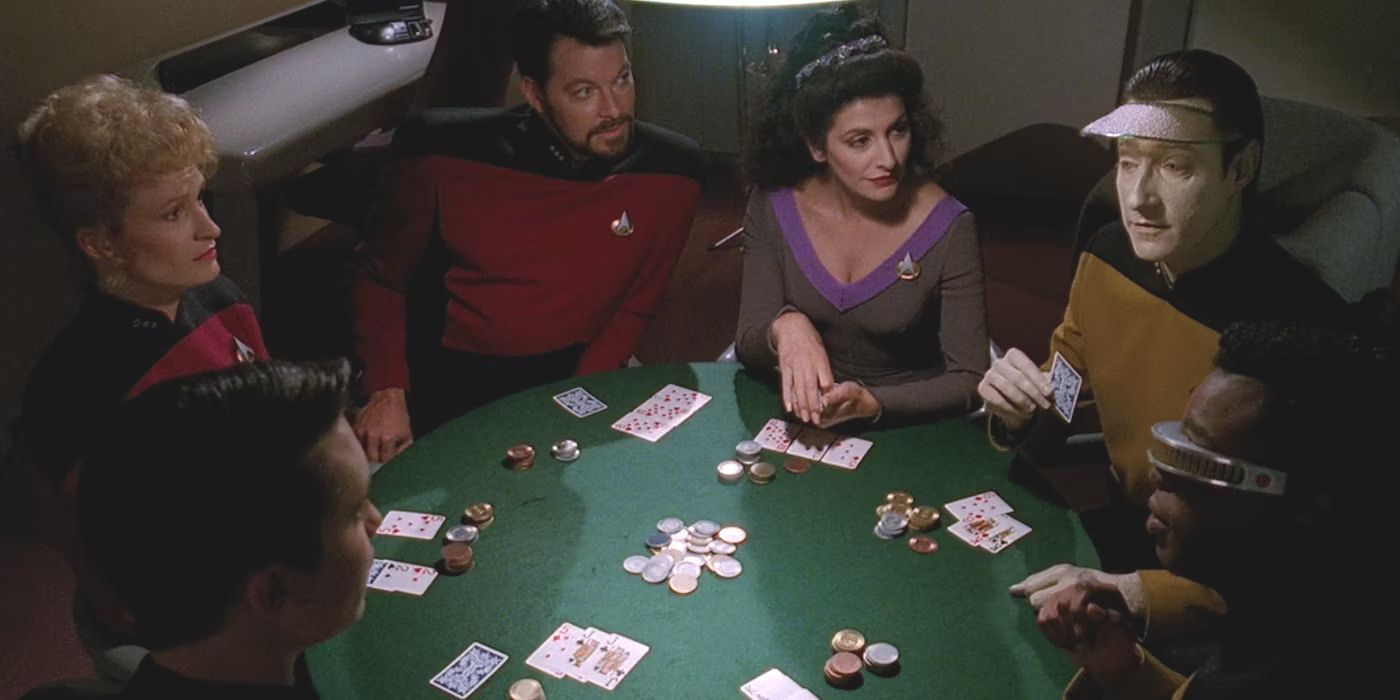Star Trek: The Next Generation is famously Gene Roddenberry’s utopian fantasy of a world without money (listen to this Marketplace episode, or read Manu Saadia’s Trekonomics or The Economics of Star Trek by Rick Webb).
This idea got sidestepped in ST:DS9 with a deep dive into Ferengi culture and their love of “latinum”, but staying within TNG for a minute, how did the crew of the Enterprise play poker without money? As one user on r/poker commented…

As you would expect from Reddit that is a bit extreme, but the point stands. Playing poker without money is like saying you’re a great stock investor but you do it all on paper and just maintain a virtual portfolio. It’s not really playing poker.
With money on the line people can get emotional. How would you be scared off when someone bets big if the money isn’t real? The real stakes are why a ‘poker face’ is even a thing. Without real money it’s just a bankroll management simulation (see also, Fingerholers).
There was a game in the TNG episode “The Quality of Life” where they played for stakes. The bet was that if Beverly Crusher won, all of the men would shave their beards, and if any of the men won, Beverly would dye her hair brown. And an episode in Voyager had the crew betting for some time off.
But most of the games they played weren’t really poker.
Real Stakes in Star Wars
Star Wars on the other hand is much more “gambler friendly.” But the best stories about the stakes of gambling in the fictional universe actually happened in the real world.
One of the many gambling games in Star Wars is sabacc, famously played by the roguish Lando Calrissian.

“Sabacc is not a fight, sabacc is life. You can bring all the skill and cleverness you want, but there’s always going to be that unknown factor, the parts you can’t control. It’s civilized in its chaos. The most civilized game in the galaxy.”
―Lando Calrissian
Lucasfilm never trademarked the term “sabacc” and so a mobile games company made a sabacc game and then trademarked the term, eventually suing Lucasfilm and Denny’s (because of a promotional tie-in).
Some of the arguments made in the case are very fun:
Defendants first argued that fictional goods, like the Sabacc game “do not exist and thus cannot be placed in commerce,” and therefore the name of the good is “not a source identifier for a product that can be distinguished in commerce.” The court rejected this argument, reasoning that plaintiffs do not claim ownership of the mark as a source identifier, but that the mark “functions as a mark for Lucasfilm and the Star Wars franchise, which are real entities that exist in commerce.”
I love the phrase “real entities in commerce!”
Defendants also argued that fictional elements of expressive works cannot function as trademarks when those elements symbolize plaintiff or its product to the public. The court rejected this argument as well, citing a number of cases that extended trademark protection to fictional elements, such as “the fictional restaurant ‘The Krusty Krab’ from the ‘SpongeBob Square Pants’ television series.”
Imagine how fun it must be for a lawyer to cite The Krusty Krab from SpongeBob as evidence!
In the end of course Lucasfilm won, and in fact the judge in the case ruled that a jury will decide how willful their copyright infringement was.
One has to wonder how dumb you have other be to sue Star Wars and Denny’s because you think you outsmarted Disney in a trademark issue.

If you want to play poker with other shareholders for real money sign up for the monthly tournament:

You must be logged in to post a comment.